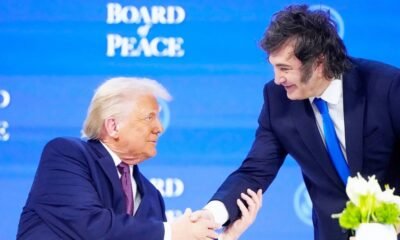INTERNACIONAL
Gun seller tells Ryan Routh: ‘I heard of you threatening people’ in tense courtroom exchange
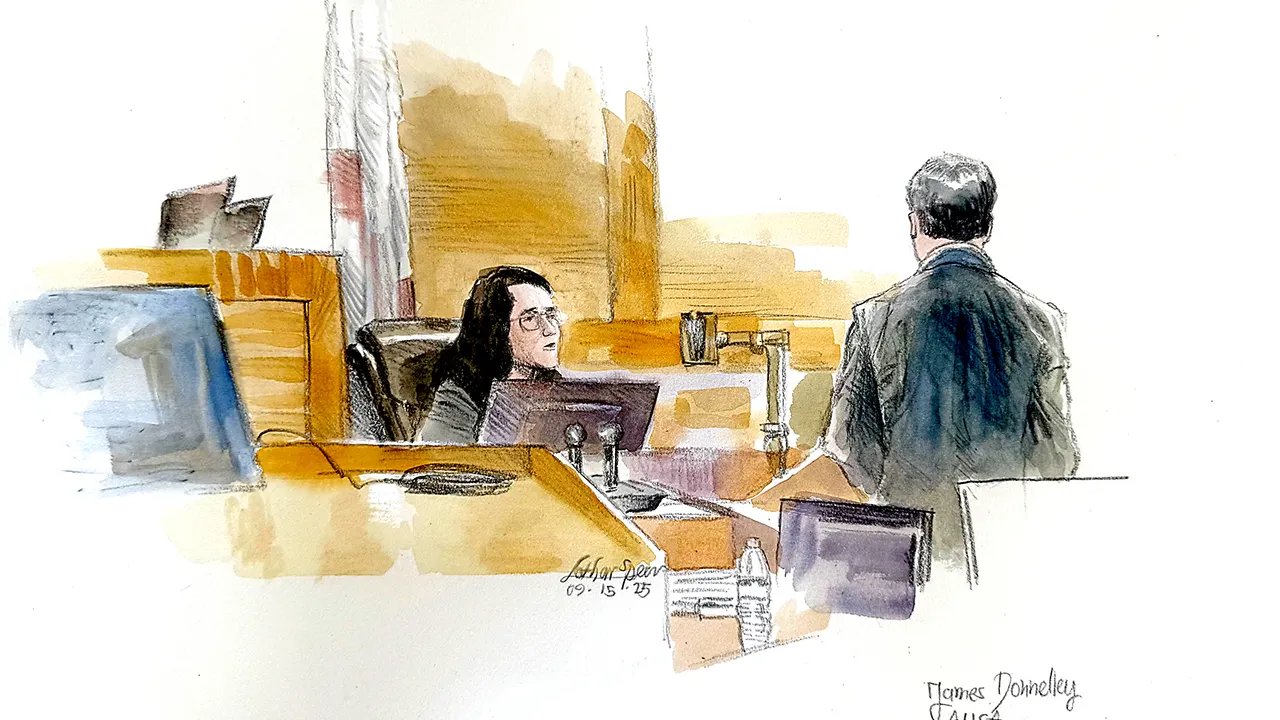
NEWYou can now listen to Fox News articles!
Jurors in the federal trial of Ryan Routh — accused of attempting to assassinate President Donald Trump at his West Palm Beach golf club in 2024 — heard pivotal testimony Wednesday from the man prosecutors say sold Routh the semiautomatic rifle tied to the case.
Ronnie Jay Oxendine, a North Carolina roofing contractor recently convicted on a firearm charge, told jurors, «I have to come to this court and tell the truth» as part of his plea deal. Shown the weapon, Oxendine said, «That used to be my rifle.»
Oxendine testified that in August 2024, intermediary Tina Cooper arranged a sale in the fenced parking lot of his office.
FBI PHONE EXTRACTIONS, DNA TESTIMONY HEADLINE DAY 7 OF RYAN ROUTH TRIAL
A sketch depicting court proceedings during the Ryan Routh trial in Fort Pierce, Florida on Sept. 15, 2025. Ryan Routh is accused of an attempted assassination on President Donald Trump at his West Palm Beach golf club in 2024. (Lothar Speer)
«Ryan gave me $350 for the rifle and gave Tina $100,» he said.
He added Routh worked the bolt, asked for ammunition and said he wanted the gun because his son «was being intimidated by his roommates.» Oxendine said Routh told him he «would remove the serial number… so it wouldn’t come back.»
He also told prosecutors he had roughly 300 firearms, denied ever removing a serial number himself, and admitted the FBI later charged him with possession of a sawed-off shotgun. He faces up to 10 years in prison and a $250,000 fine.
During cross-examination, Routh began by telling Oxendine, «Great to see you again… I know you’re extremely mad at me,» before asking if the year he has already spent in custody could be applied to Oxendine’s sentence. Judge Aileen Cannon struck the comment from the record and warned Routh against further outbursts.
RYAN ROUTH TRIAL CONTINUES AFTER AGENT TESTIFIES SUSPECT AIMED RIFLE AT HIM ON TRUMP’S GOLF COURSE
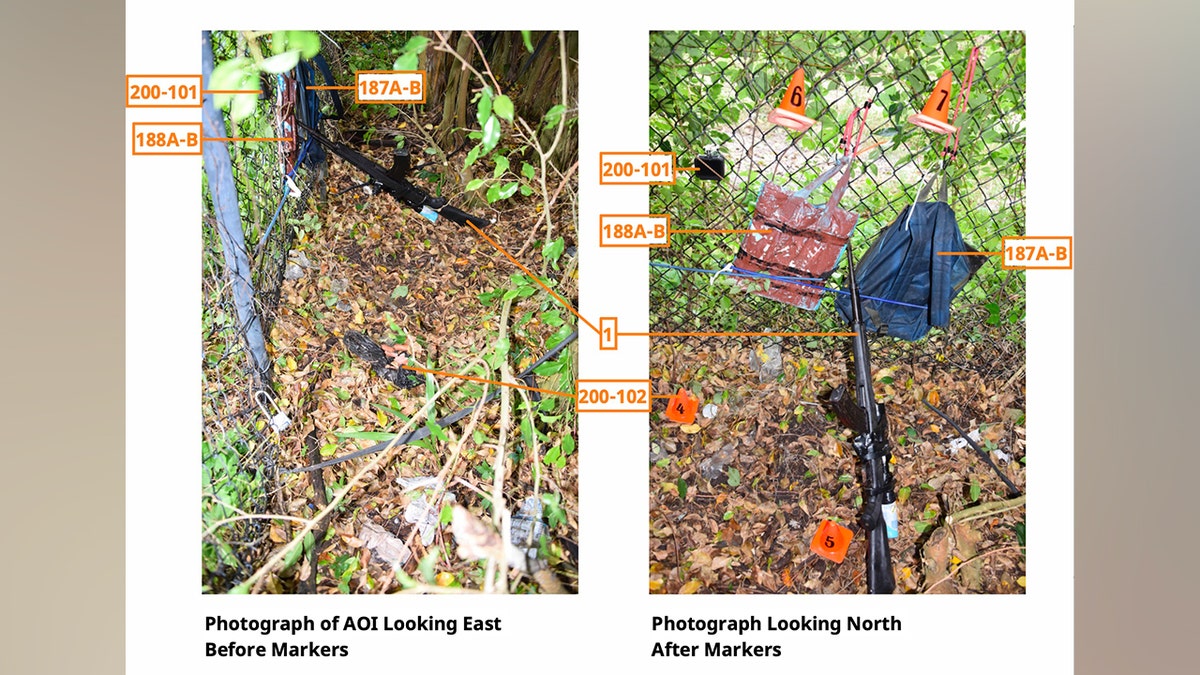
Images of exhibits presented in court by the government during the Ryan Routh trial in Fort Pierce, Florida on Sept. 17, 2025. Ryan Routh is accused of an attempted assassination on President Donald Trump at his West Palm Beach golf club in 2024. (DOJ)
Routh asked Oxendine about whether he knew him to be violent.
«Have you ever known me to hurt anyone?» Routh asked. Oxendine replied, «I know you were loud.»
When asked if he knew Routh to be gentle, Oxendine said, «I don’t know you that well. I heard of you threatening people.»
The courtroom also heard from FBI Task Force Officer Patrick Lantry about surveillance at a South Bay, Florida truck stop, where investigators found orange earplugs and empty Vienna sausage cans.
Routh’s questioning took a turn when he addressed the empty Vienna sausage cans on the ground around the truck stop. He said there were bugs and ants crawling around and then asked if it was possible food was left out to feed them.
Lantry replied that it was possible, and then Routh said it was a nice gesture but that whoever left the food did not clean up, and that he should have.
RYAN ROUTH TRIAL: JURY SELECTION BEGINS IN TRUMP ASSASSINATION ATTEMPT CASE
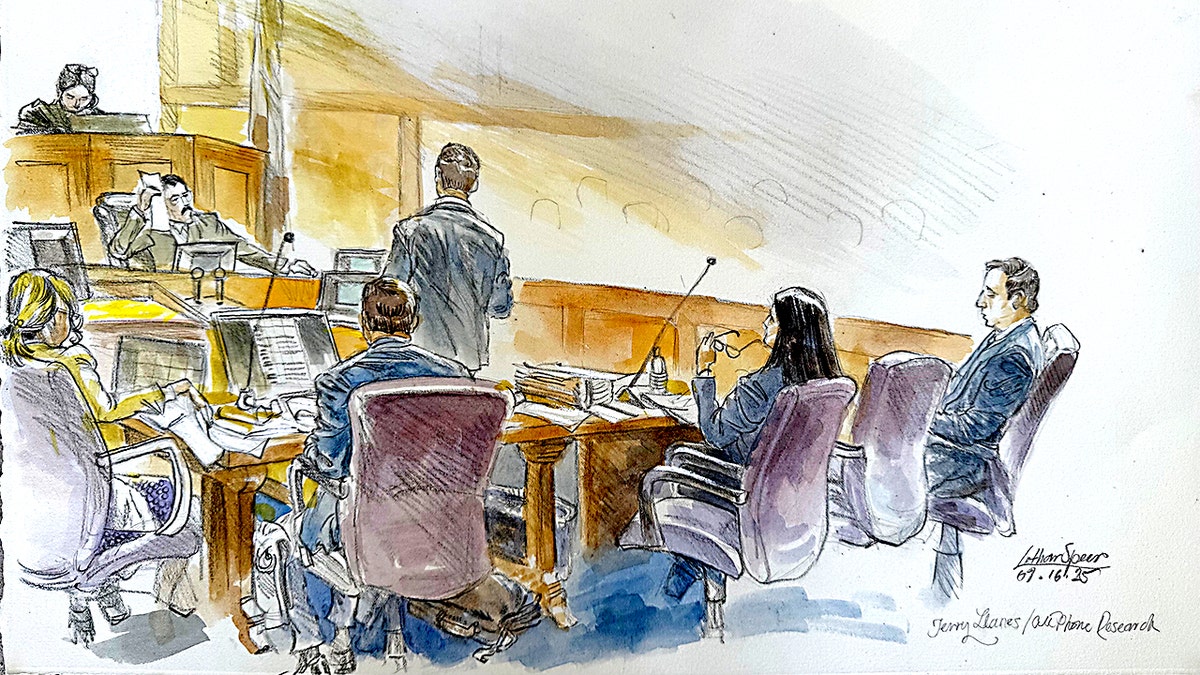
A sketch depicting court proceedings during the Ryan Routh trial in Fort Pierce, Florida on Sept. 15, 2025. Ryan Routh is accused of an attempted assassination on President Donald Trump at his West Palm Beach golf club in 2024. (Lothar Speer)
AT&T employee Aaron Thompson testified that Routh bought a prepaid line under the name «John White.» When Routh told him, «I don’t know how trustworthy you are,» Cannon struck it from the record.
CLICK HERE TO GET THE FOX NEWS APP
Prosecutors are expected to wrap up their case on Thursday. The defense has been told to have its witnesses ready on Friday. Routh has indicated he’ll call a firearms expert and character witnesses, but it’s still unclear if he’ll testify on his own behalf.
Fox News’ Samantha Daigle contributed to this report.
donald trump,politics,judiciary,assassinations murders
INTERNACIONAL
Argentina le pide ayuda a Estados Unidos para liberar a Nahuel Gallo en Venezuela
INTERNACIONAL
El Foro Penal confirmó que al menos 20 presos políticos fueron excarcelados este domingo en Venezuela

Al menos 20 presos políticos fueron excarcelados este domingo en Venezuela, según confirmó la organización no gubernamental Foro Penal, en una de las liberaciones más amplias registradas en un solo día desde el anuncio del régimen chavista el pasado 8 de enero.
“Al menos 20 presos políticos excarcelados el día de hoy. Seguimos verificando”, informó el director de la ONG, Alfredo Romero.
De acuerdo con los registros preliminares de la organización, las liberaciones se produjeron en distintos centros de reclusión del país, entre ellos la sede del Servicio Bolivariano de Inteligencia (Sebin) en El Helicoide, y alcanzaron a dirigentes políticos, activistas regionales, defensores de derechos humanos y ciudadanos con doble nacionalidad.
Entre los casos confirmados figura el del defensor de derechos humanos Javier Tarazona, director de la organización Fundaredes, detenido desde el 2 de julio de 2021.
“Ya en libertad junto a su madre y hermano José Rafael, quien también fue preso político en Venezuela”, indicó el Foro Penal.
Tarazona fue acusado de incitación al odio, terrorismo y traición a la patria. Su caso se convirtió en uno de los más emblemáticos de la criminalización de defensores de derechos humanos en el país, tras haber denunciado un conflicto armado en la frontera con Colombia en 2021.
Fundaredes destacó que su detención estuvo marcada por la “falta de garantías judiciales, el irrespeto al debido proceso y condiciones que vulneraron sus derechos fundamentales”.
Entre los excarcelados también figura Luis Guillermo Istúriz González, abogado y dirigente del partido Vente Venezuela, quien permanecía detenido desde el 24 de agosto de 2024 y se encontraba recluido en El Helicoide.
El Foro Penal confirmó que Istúriz había sido sentenciado a 30 años de prisión en la misma causa en la que fue procesado Rafael Tudares, yerno del presidente electo Edmundo González Urrutia. Videos difundidos en redes sociales mostraron su reencuentro con su familia tras más de un año privado de libertad.
En el grupo de liberados también fue confirmada la dirigente regional Lorenia Guadalupe Gutiérrez Bolívar, coordinadora de Vente Venezuela en el estado Bolívar, detenida el 25 de agosto de 2025 durante un allanamiento sin orden judicial, según denunció su entorno. Su caso había sido señalado por organizaciones de derechos humanos como un ejemplo de la persecución contra estructuras políticas de base.
La ONG verificó igualmente la liberación de Mauricio Giampaoli, ciudadano ítalo-venezolano detenido desde el 23 de marzo de 2024; Yandir Loggiodice, secretario general nacional del Partido Centro Democrático, detenido el 14 de julio de 2025; Víctor Enmanuel Castillo Vizcaya, detenido desde abril de 2024; Willians Antonio Díaz Rolong, arrestado en mayo de 2025; Rodrigo Antonio Pérez Mejías; Omaira Josefina Salazar; Guillermo de Jesús López, detenido desde enero de 2024, así como Pedro Javier Fernández Rodríguez y Orangel Tabares, incluidos en la lista oficial de liberados del día.
Entretanto, La líder opositora de Venezuela y Premio Nobel de la Paz 2025, María Corina Machado, celebró la excarcelación de Javier Tarzana tras más de cuatro años en prisión.
“Querido Javier, me conmueve verte finalmente abrazando a Teresa, tu mamá y a tu hermano José Rafael. Venezuela toda admira y respeta tu valentía y tu entrega”, escribió Machado en sus redes sociales. En la misma publicación sostuvo que en el país “habrá justicia” y pidió la liberación de todos los presos políticos.
Fundaredes, por su parte, agradeció el respaldo de organizaciones nacionales e internacionales, periodistas y ciudadanos, y afirmó que durante más de cuatro años el caso de su director se convirtió en un símbolo de la persecución contra defensores de derechos humanos.
Las excarcelaciones de este domingo se producen en el marco de un proceso anunciado por el régimen chavista, que contempla la revisión de casos de personas detenidas por motivos políticos. El viernes, Delcy Rodríguez informó que se impulsa una propuesta de ley de amnistía para personas privadas de libertad por razones políticas desde 1999 hasta la actualidad.
El Foro Penal ha venido documentando de manera sistemática los casos de detención por motivos políticos en el país y señaló que continuará verificando la identidad de los liberados y las condiciones de su excarcelación. Hasta el sábado, la organización había confirmado la salida de prisión de 310 personas como parte de este proceso.

La ONG advirtió que la verificación continúa, debido a que las excarcelaciones se realizan de forma escalonada y, en varios casos, las familias reciben notificación informal poco antes de que los detenidos sean trasladados fuera de los centros de reclusión.
South America / Central America,Government / Politics,Civil Unrest
INTERNACIONAL
Donald Trump confirmó que hay diálogo con los «altos mandos» de Cuba para buscar un acuerdo
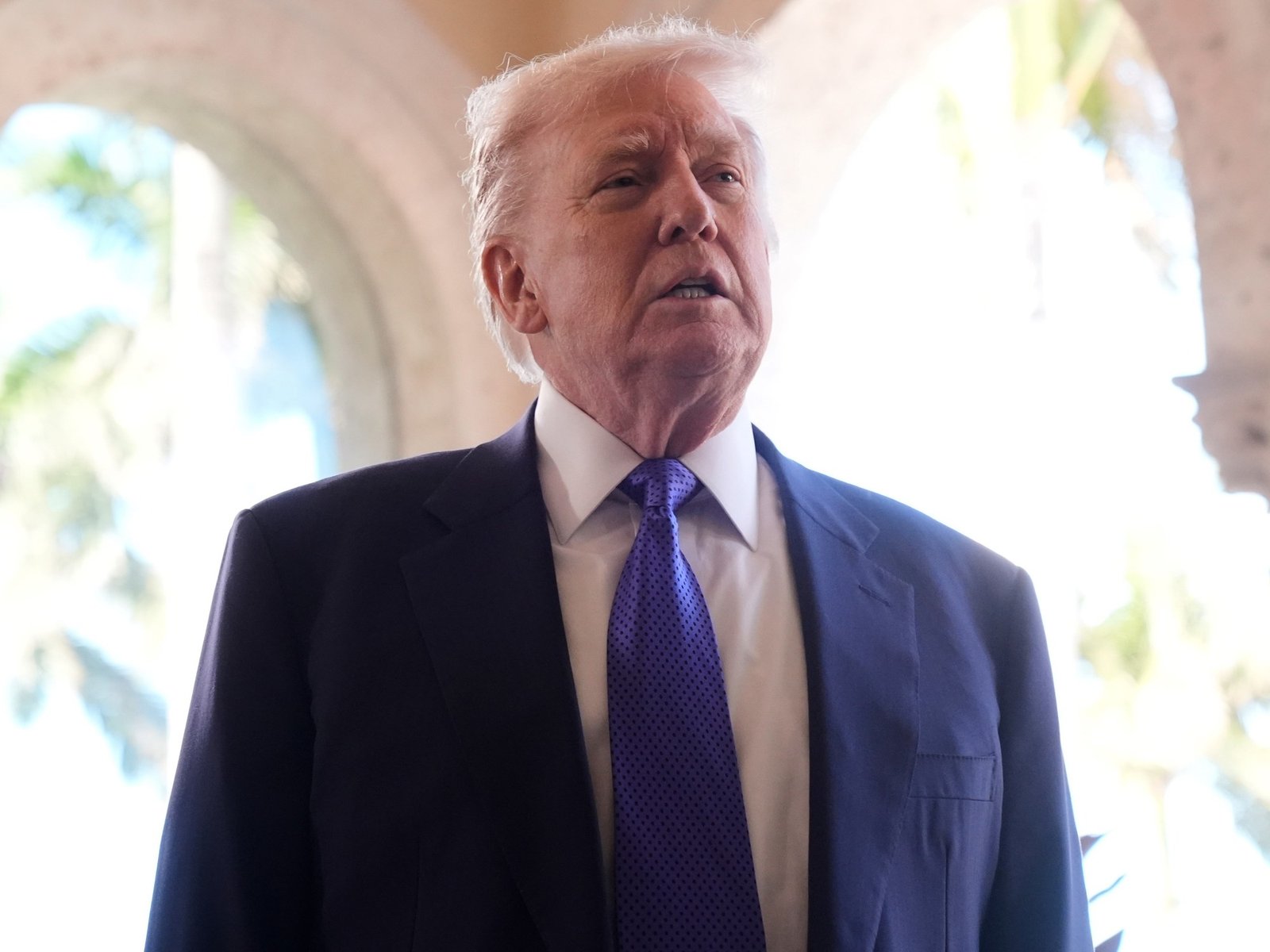
El presidente de Estados Unidos, Donald Trump, habló este domingo desde su casa en Mar-a-Lago, donde confirmó que su gobierno está hablando con los «altos mandos» cubanos con el objetivo de «llegar a un acuerdo» y advirtió que la isla «está en muy mal estado, tiene un problema humanitario».
«Cuba es una nación fallida. Lo ha sido durante mucho tiempo, pero ahora no tiene a Venezuela para apuntalarla. Así que estamos hablando con la gente Cuba, altos mandos de Cuba, y veremos qué pasa», señaló el mandatario estadounidense en conferencia de prensa.
En ese sentido, Trump expresó su deseo de que «la gente que vino aquí, que fue tratada horriblemente por Cuba, quiero que sean cuidados, que puedan volver… Tienen familia allá, no han podido verlos en muchos años».
«Así que creo que vamos a llegar a un acuerdo con Cuba. Está en muy mal estado, tiene un problema humanitario», completó.
Las declaraciones de Trump llegan a menos de una semana de que el mandatario estadounidense firmase una orden ejecutiva en la que preveía la imposición de aranceles a aquellos países que le vendiesen petróleo al país caribeño. En ese mismo acto había declarado una emergencia nacional.
En el documento, firmado el jueves pasado, se señalaba a Cuba como responsable de apoyar el terrorismo, de «desestabilizar la región mediante la inmigración y la violencia» y de difundir «sus ideas, políticas y prácticas comunistas por todo el hemisferio occidental».
A consideración del republicano, las políticas, prácticas y acciones del gobierno cubano «constituyen una amenaza inusual y extraordinaria» para la seguridad nacional y la política exterior de su país
«Por ejemplo, Cuba alberga descaradamente a peligrosos adversarios de Estados Unidos, invitándolos a establecer en Cuba sofisticadas capacidades militares y de inteligencia que amenazan directamente la seguridad nacional de Estados Unidos», sostenía la orden ejecutiva.
El mandatario estadounidense se había pronunciado al respecto más tarde el mismo día, durante la presentación del documental de la primera dama estadounidense, Melania Trump. “Parece que no podrá sobrevivir. Cuba no podrá sobrevivir”, advirtió en esa oportunidad.
Cuando al mandatario republicano le preguntaron si su estrategia apuntaba a “ahogar” a Cuba, respondió que esa palabra es “muy dura”. En esa ocasión y en línea con sus declaraciones de este domingo, ya había definido al país caribeño como “una nación fallida”.
“Hay que sentirse mal por Cuba, porque han tratado muy mal a su gente. Tenemos muchos cubanoestadounidenses que fueron tratados de manera injusta y que sueñan con volver”, expresó.
El propio subsecretario de Estado de EE.UU., Christopher Landau, había asegurado el miércoles que Washington desearía que en durante 2026 los cubanos puedan “ejercer sus libertades fundamentales”, en una clara señal de que la Casa Blanca apuesta a un cambio político en la isla
En tanto, según sostuvo la agencia EFE, cerca de una decena de países europeos y latinoamericanos estarían actualizando planes de evacuación y listados de nacionales residentes en Cuba, en algunos casos contactándolos uno por uno para verificar datos y disponibilidad.
Otras sedes diplomáticas habrían avanzado incluso en la logística para resistir largos períodos sin suministro eléctrico, combustibles y agua potable, eventualidades que consideran posibles ante la combinación de una crisis estructural en la isla y la creciente presión ejercida por Washington.
El viernes el Gobierno argentino emitió un comunicado en el que recomienda no viajar al país del Caribe. La cancillería justificó su medida «ante el deterioro de las condiciones de vida en Cuba».
— Cancillería Argentina 🇦🇷 (@Cancilleria_Ar) January 30, 2026
«Se recomienda a los ciudadanos argentinos evitar o posponer viajes turísticos a la isla. Se sugiere a quienes residan actualmente en ese país mantenerse atentos a la evolución de la situación», indicó la cartera que encabeza Pablo Quirno.
En el sector privado, varias filiales de empresas internacionales admitieron en reserva que la incertidumbre geopolítica las llevó a replantear su continuidad operativa en Cuba junto a sus casas matrices.
Los dos factores centrales que mencionan son una eventual intervención militar estadounidense -por limitada o “quirúrgica” que pueda ser- y el impacto del profundo deterioro económico del país, marcado por el aumento de los apagones y la crítica escasez de combustibles, según fuentes empresariales.

 CLIMA NOTICIAS2 días ago
CLIMA NOTICIAS2 días agoA qué hora puede llover hoy en CABA, según el Servicio Meteorológico Nacional

 CHIMENTOS2 días ago
CHIMENTOS2 días agoJulieta Díaz contó por qué no funcionó su noviazgo con Luciano Castro en medio de la separación con Griselda Siciliani

 POLITICA3 días ago
POLITICA3 días agoMaximo Kirchner propuso que Axel Kicillof presida el PJ Bonaerense

